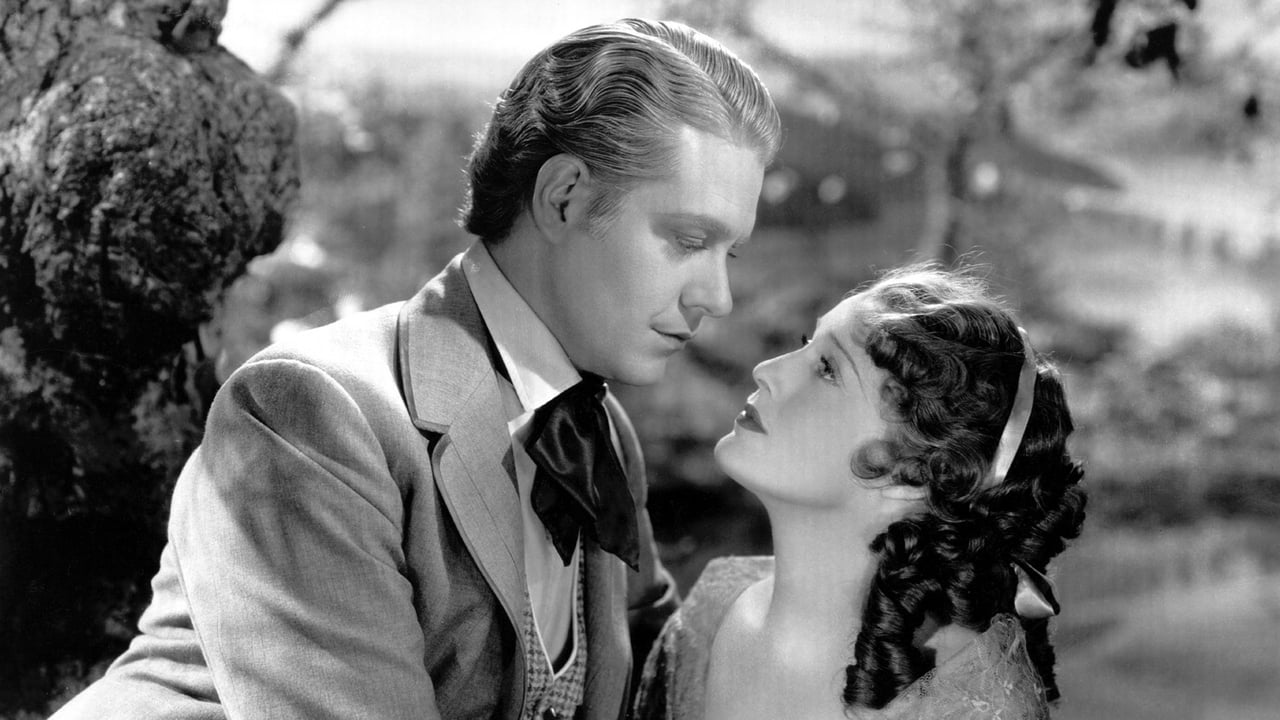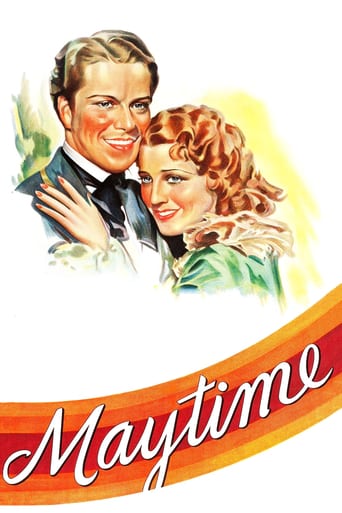

NOTES: "Maytime" originally commenced production under the personal supervision of Irving Thalberg. The director was Edmund Goulding. The Goulding script bore almost no resemblance to the "Maytime" we know. Margaret and Ed are young opera singers played by Jeanette and Nelson. They want to marry but Ed chauvinistically insists that Margaret give up her career and be a housewife (a recurring theme in films of the thirties.) They seek the advice of an elderly diva, Peggy, who tells them the story of her youth. In a flashback we see the diva as a young girl, now played by Jeanette. She has had a similar argument with her beau, Richard Wayne (Nelson). Both are employed by a second rate touring company managed by Herman Bing. (Managed by Bing, it couldn't help but be second rate!). The pair split through personal weakness and vanity. Peggy marries her maestro (Paul Lukas) out of spite and Richard marries the wardrobe girl (noted stage actress Julie Haydon) who bears him two sons. Richard and Peggy are re-united years later and have quite an enjoyable time renewing old acquaintance until Peggy's husband takes a shot at them when he catches them necking in the garden. The bullet is stopped by Richard's faithful wife who survives. This puts a crimp in their relationship and they don't meet again for another ten years, when they discover they now don't give a hang for each other. A number of scenes were shot before Thalberg's premature death, including a sequence from Act 2 of Puccini's "Tosca". All these scenes were discarded.In original release prints, the May Day sequence and the finale were processed in sepia.COMMENT: Easily the best MacDonald/Eddy picture, and Miss MacDonald's personal favorite of all her films. It gave her the opportunity to cross swords with John Barrymore, and the sound recording, despite a few infelicities here and there, was far superior to Metro-Goldwyn-Mayer's usual puny efforts. MGM opulence in period sets and costumes is much in evidence, there are Vorkapich montages a-plenty, gorgeous photography, and fast-paced stylish direction. What more could a fan ask for? Langley's screenplay provides a brilliant setting for the singers/players and a heyday for cinematographer Marsh. No expense has been spared. Nelson Eddy fans will want to see Maytime anyway, even though the plot is already well advanced before he makes his extremely late entrance. Even when he does finally appear, Miss MacDonald still has the lioness' share of the singing. Furthermore the director has frequently allowed Mr. Eddy - when he is not being up-staged by his radiantly photographed and lavishly costumed co-star - to be pitted against Mr. Herman Bing, a low clown of the old fumble-fingered, bungled-dialect school whose fractured speech and facial tics are far more wearisome than amusing. The film has been lavishly produced — though there is evidence of cost-cutting here and there — the pan from the ballroom to Napoleon is actually a laboratory wipe and it looks like the same stairs are being used both for the entrance to the ballroom and the ballroom itself. On the other hand, some of the sets are very richly furnished and the Adrian costumes so becomingly modeled by Miss MacDonald are absolutely gorgeous. On yet the other hand, while Miss MacDonald's aged make-up is very convincing in the long shots and some of the medium shots, the close-ups spoil the effect, despite all Marsh's soft-focus work. The sound recording is very fuzzy in places (especially under the credit titles) though generally it is superior to that hitherto enjoyed by Miss MacDonald in her MGM films. RZL has directed with a bit of style. Though he relishes the low comedy elements, he still knows when to tell the photographer to track his camera effectively through Metro's extensive sets. In fact, Oliver Marsh's beautifully toned, lustrous, radiant and flattering and yet at times very suitably moody and atmospheric photography is a major asset. Barrymore gives a calculated but very watchable performance, and the support cast is absolutely loaded with character players. though few of them have much opportunity to shine — a drunken Billy Gilbert interjecting in Eddy's first song and Sig Rumann demanding Eddy and Bing be ejected from the opera is about as good as they get. In fact, Rafaela Ottiano is a bore and Tom Brown is boorish. Although the shadow opera based on Tchaikovsky serves as the climax, it is by no means the highlight of the opera program which features Meyerbeer's now rarely performed "Les Huguenots" and a Slavko Vorkapich montage — all featuring Miss MacDonald.
... View MoreThis film was wonderful. There were a lot of wonderful films throughout the 1930s, 1940s, and early 1950s. Maytime is a sweet and emotional story, and also a very well made out tearjerker. The real tearjerker parts I cannot write here without giving away the ending. The beginning of this film shows an old fashioned innocent world that is long long passed us. Parents with their kids on Mayday with music and dancing around the flagpole. Mayday is another holiday which was much more widely celebrated generations ago. We meet an aging Jeanette MacDonald and a few other characters in the first part of the film which was in the present (1930s), but then we get taken back about 50 years, or to sometime in the late 19th century, to Jeanette's young adulthood as the fiancée of a wealthy aristocratic (John Barrymore). Janette's story is told in the 1930s scene to a nice young woman (Lynn Carver) who just had an argument with her boyfriend. She sits with her in her nice, pleasant back yard under a blossom tree, comforts her and starts telling her story, and we then see the scene change to a fancy ball being held in a royalty style mansion. I loved the music there, the look and feel of that setting with everyone dressed very formally, the men in tuxes and the women in their fancy, wide, floorlength ballgowns. I absolutely love seeing women in these old films in those beautiful, wide, floorlength dresses. It was a more common sight back in older times, in films and in real life. After seeing the beautiful dancing and attires, we then get our first sampling of Jeanette singing in her beautiful opera voice, two wonderful songs in a row at the palace ball. Jeanette's opera was very well received by the other guests at the ball, and by 1930s film viewers in theaters from what I have read. After the singing and dancing, dinner is served in the dining room. Seeing that rich food molded into those fancy shapes that the servants brought out, I'm guessing were fancy casserols made of only the freshest and highest quality ingredients that no one could ever afford back then except the very elite and royalty. As the film progressed we see Jeanette meeting Nelson Eddie, a popular saloon singer, who (can't blame him) strikes a fancy with Jeanette and the two start getting more infatuated with each other and romance blooms. That's the part that's similar in most of the films Jeanette and Eddie are in together, but the two of them always seem so well made for each other. That sweet old fashioned romance and passion was one of the things that made a lot of old films so great, and Janette and Eddie were two of numerous wonderful couples from the Golden Age. Others were Fred Astaire and Ginger Rogers, William Powell and Myrna Loy, Dick Powell and Ruby Keeler, and there were other couples that had that similar wonderful romantic passion together that has become less common today. Since Jeanette is engaged to Barrymore but falling in love with Eddie, a conflict starts up. It is all done very well. Also were the wonderful songs, and Eddie shares Jeanette's opera talent. Herman Bing plays his usual flustered character with his European accent as Eddie's friend. Then we get to the wonderful tear jerker. This film is amazing.
... View MoreThis film was one of Irving Thalberg's personal projects. He had planned to make it a color film, but then he died of a heart attack in 1936 and the footage that had been shot was scrapped. A year later the project was resurrected resulting in the film we have today. It features the great voices of Jeanette McDonald and Nelson Eddy, lavish production values, some great examples of McDonald's singing in her prime, and one of the last great roles the legendary John Barrymore ever had. Although the movie is 72 years old, I'll just warn you that what could pass for spoilers are in the rest of the review.I have the VHS tape, but I also saw it on TCM one night as part of their guest programmers' month. During the film's introduction, the guest host said something that forced me to look at this film in a new light. She said "it's a lot like Titanic". You know, she was right. In many ways if you delete the music, make the site of the entire movie a doomed ship, and make John Barrymore a worse shot, you have James Cameron's Titanic. It makes me wonder how much he was influenced by this movie when he made his own film.Where the films part ways is that this film more accurately portrays the attitudes of the times in which it was set than Titanic did. The love story is very moving and the music just adds to its poignancy. Also, John Barrymore turns in a perfect supporting performance as Jeanette's patron turned husband who realizes his wife doesn't love him but doesn't realize why until he sees Eddy and McDonald onstage together during a performance. Barrymore says few lines in this film, but his mannerisms and facial expressions say it all. If the ending of the movie doesn't tug at your heart, I don't know what will. Highly recommended.
... View More"Maytime" is, I believe, the most popular film of that very popular singing team of Nelson Eddy and Jeanette MacDonald. The story, based on the Romberg operetta, tells the story in flashback of a beautiful young opera singer (MacDonald), under the wing of her teacher (John Barrymore) who in spite of herself falls in love with a baritone (Eddy) though she's promised to marry her teacher. She chooses loyalty and career over true love, with tragic results.This isn't the most feminist film you'll ever see, as the elderly Miss Morrison (MacDonald) tells her story to a young woman who wants to throw her boyfriend over and pursue her career in New York. Nevertheless, it's the setting for a touching tale and gorgeous music sung by MacDonald and Eddy.MacDonald was beautiful and a fine actress, and she had parts of her voice, particularly the middle range, that were absolutely beautiful. Her high notes and singing technique - well, not so great. Some of it was the way female singers were taught to sing "white" high notes - backing off of them and straightening the tone, and part of it was the unsophisticated recording devices. The difference in placement between her voice and Eddy's, who sang a frontal placement all the way up, is remarkable. The montages show the great female star singing Trovatore and Wagner - not with that lyric coloratura voice, she wasn't. Eddy sings magnificently throughout, though he was never the presence that MacDonald was.Have some tissues ready. It's a lovely story, and the acting is very good. MacDonald is very touching and Barrymore is appropriately villainous and also underplayed, for those who think he was a big ham.It's one of those films you'll always remember, especially the ending, and that's what the film is about - remembrance.
... View More